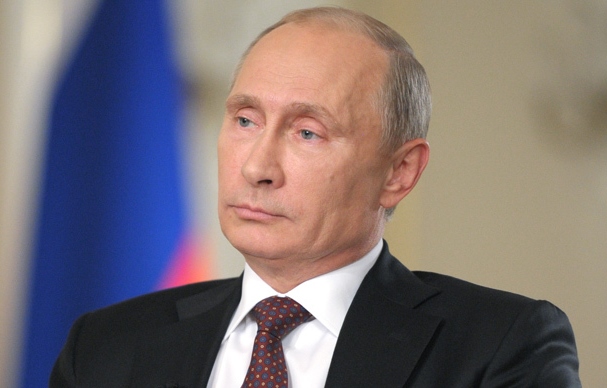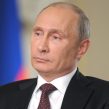
Moscow Believes Ukrainian Protests Are Western-Organized Conspiracy
Publication: Eurasia Daily Monitor Volume: 10 Issue: 218
By:

Under Russian pressure, Ukrainian President Viktor Yanukovych refused to sign an association and free-trade agreement with the European Union at the Eastern Partnership summit in Vilnius on November 29, triggering mass protests in Kyiv and other Ukrainian cities (see EDM, December 2, 4). In the early hours of November 30, Berkut—the Ukrainian riot police force—suddenly attacked protesters occupying Independence Square in central Kyiv using batons and tear gas. Dozens were reported injured as the square was cleared—officially to erect a Christmas tree. This act of unprovoked police brutality galvanized the protest movement in Ukraine; hundreds of thousands of protesters took to the streets in Kyiv and other cities. The Independence Square was re-occupied and barricades were erected. Protesters have occupied nearby public buildings: The Kyiv mayor’s office and a trade union headquarters. Government buildings have been partially blockaded by the protesters and there were violent clashes with riot police on December 1 and 2 (https://www.kommersant.ru/doc/2357664). The protesters are now demanding Yanukovych and his government resign followed by new parliamentary and presidential elections.
In a column published in Moscow, former leading Russian TV news anchor Yevgeny Kiselyov, who since 2008 moved to work in Kyiv to avoid Russian censorship, listed President Vladimir Putin’s recent streak of public victories: granting asylum to the United States National Security Agency (NSA) intelligence leaker Edward Snowden, who has damaged the cohesion between Western allies; “forcing the US, Britain and France to abandon plans for military action against Syria”; disrupting “plans by the EU to sign the Association Agreement with Armenia,” which is joining the Customs Union with Russia; Forbes magazine naming Putin the most influential politician in the world; and finally the EU debacle with Yanukovych in Vilnius. According to Kiselyov, Russia is leading the US 5–0—“if this were a soccer match, it would be a complete rout.” Kiselyov believes “President Barack Obama, as many had long suspected, turned out to be weak, and he was beaten,” while Europe “has taken a licking as well.” But Putin’s winning streak could turn out to be a “Pyrrhic victory” if the massive Ukrainian protests continue (https://www.themoscowtimes.com/print/article/putins-pyrrhic-victory-in-ukraine/490597.html).
As the public protests continue to undermine Putin’s apparent “victory” in Ukraine, the Kremlin is growing anxious. Deputy Duma speaker Vladimir Zhirinovsky applauded Berkut’s brutal assault on Independence Square demonstrators; he called on Yanukovych not to stop halfway but to carry out mass arrests of the “foreign agents” protesting in Kyiv’s streets as well as impose martial law. Zhirinovsky is an outspoken nationalistic demagogue, who has survived on the Russian political scene for more than 20 years by closely following the Kremlin political line. Zhirinovsky, through backdoor connections, tends to know Putin’s take on important issues and often expresses Putin’s views in words Putin cannot use publicly out of political correctness. According to Zhirinovsky, Russia has “won” in Ukraine because it had offered Yanukovych a better deal, while the losing West “has smuggled into Ukraine arms, narcotics, counterfeit currency and trained fighters” to overthrow Yanukovych and his government. Zhirinovsky expressed confidence that the authorities will defeat “this provocation,” that the Ukrainian opposition leaders will be arrested and their political parties banned, and that “the pro-Western fifth column will be again defeated” (https://lifenews.ru/#!news/123427).
Just one day later on December 2, a visibly angry Putin, speaking in Yerevan during a state visit to Armenia, used some of Zhirinovsky’s definitions to describe the situation in Ukraine. According to Putin, events in Ukraine “are not a revolution, but a pogrom” by “well organized groups of fighters.” The political opposition in Ukraine is acting as a cover for extremists while legally elected authorities are being undermined. And all this, according to Putin, was prepared in advance by these groups to take power during the 2015 presidential elections in Ukraine, but has been enacted prematurely today. Putin complained that the economic essence of the association and free-trade agreements with the EU are not being discussed in Ukraine, but that Moscow will, nonetheless, accept any legally taken Ukrainian decision on its further relations with Russia and the West (https://www.kremlin.ru/transcripts/19741). Ukrainian Prime Minister Mykola Azarov, echoing Putin, in turn branded Ukrainian protesters as well-trained provocateurs and “militants” (https://en.interfax.com.ua/news/general/179330.html).
A reintegration of the post-Soviet landmass into a Russian-led Eurasian Union has been Putin’s principal longstanding political and economic goal. Western attempts to build up relations with former Soviet republics, as well as plans to expand these countries’ associations with the EU and the North Atlantic Treaty Organization (NATO), are seen in the Kremlin as profoundly hostile moves that must be resisted at all costs. During the visit to Armenia, which has recently agreed to join Russia, Belarus and Kazakhstan in the Customs Union (seen by Putin as the nucleus of the future Eurasian political and economic Union), Putin stopped in Gyumri—Russia’s main garrison town in the region. There, he declared, “We will never leave Transcaucasia [the South Caucasus]—we intend to strengthen our presence” (https://ria.ru/world/20131202/981259910.html#ixzz2mcLqUplt).
Armenia and the South Caucasus are an important, but essentially peripheral objective in Putin’s Eurasian reintegration drive, while Ukraine is the core issue. Putin has, for some time, been describing how Ukraine will suffer serious economic damage if it decides to side with the EU; he warned that Ukraine’s aeronautic industry, which cooperates with Russia, may close down and argued that it would be better to negotiate with the EU as a single Eurasian bloc. According to Putin, “Russians and Ukrainians are one people” with a common history. Moreover, he insisted that Russia donated territory and populations to Ukraine in the past and that “in the future, no matter what, we will be together” (kremlin.ru, September 4). The Russian president apparently does not consider Ukraine a true nation separate from Russia, but millions of Ukrainians protesting in Kyiv and other cities seem to disagree.
Moscow still hopes that Yanukovych will weather the political storm as street demonstrations dwindle with the coming Christmas and New Year’s holiday season, or that the authorities will eventually use brute force to suppress the protests. Russia seems ready to offer Yanukovych cheaper natural gas and a multi-billion-dollar loan. But in exchange, Kyiv must end its balancing act between Moscow and Brussels by agreeing to sign some obligation or “road map” to eventually join the Customs Union, according to First Deputy Prime Minister Igor Shuvalov (https://www.1prime.ru/Politics/20131202/771985522.html). The Ukrainian political crisis will surely have a devastating effect on relations between Moscow and the West no matter what the final outcome. Harsh words and threats of sanctions are already being exchanged and more profound unfriendly action may follow.




